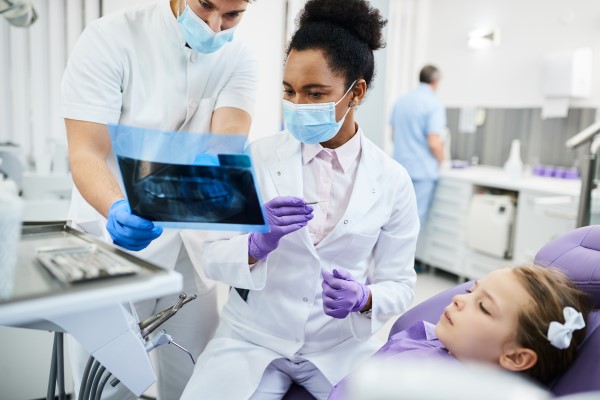4 Questions to Ask a Pediatric Dental Specialist About Pediatric Dental X-Rays

Pediatric dental x-rays are helpful tools that allow dentists to provide targeted dental care to their young patients. Dental x-rays allow dentists to diagnose dental and orthodontic problems. Periodic x-rays allow pediatric dental specialists to monitor the growth and development of their young patients’ mouths.
While the benefits of kids’ x-rays are pretty obvious, many parents will have their misgivings. The low levels of radiation that come with x-ray imaging are a common concern. Keep reading to learn more about children’s dental x-rays.
4 Common questions about pediatric dental x-rays
X-rays pass easily through the body's soft tissues, but they find an obstacle in dense, hard tissue like cartilage, bone, and teeth. This interaction with different types of tissue is the principle behind x-ray imaging. A radiologist or dentist will take an x-ray by doing the following:
- The dentist will position the child in a special seat near the x-ray machine
- They will cover the child’s torso with a lead apron and tie a thyroid protector around the child’s neck
- Next, the dentist will position a frame with an x-ray film in the child’s mouth
- They will ask the child to bite down on the film
- Lastly, the dentist will turn on the x-ray machine, which will direct x-rays toward the film in the child’s mouth
Here are some common questions parents ask pediatric dental specialists about kids’ x-rays:
1. Are pediatric dental x-rays necessary?
X-rays are a diagnostic tool that allows dentists to find out what is going on beneath the gums. Without x-rays, a pediatric dentist could miss dental problems like cysts, impacted teeth, and orthodontic issues.
Periodic x-rays are a monitoring tool that allows dentists to track the growth and development of the oral cavity.
2. Who performs a dental x-ray?
Most dentists have the know-how and certification to perform pediatric dental x-rays. Many others work with radiologists who may be in-house staff or external consultants.
3. Are pediatric dental x-rays safe?
Yes, they are. The amount of radiation that comes out of an x-ray machine is comparable to the amount of radiation the body absorbs from the sun in a few minutes. Also, precautionary measures like a lead apron further minimize the radiation the patient is exposed to. It is also good to know that digital x-rays put out less radiation than their analog cousins.
4. How often does a child need a dental x-ray?
It depends. A child with no apparent dental problems will only need an annual set of x-rays. However, a young patient with ongoing dental issues may need x-rays once every couple of months.
Ready to set up an appointment?
When was your child's last dental check-up visit? If it is time for their next visit, we encourage you to contact our dental office today to schedule an appointment with a pediatric dental specialist. Your child will receive a thorough examination of their teeth, gums, and mouth, as well as pediatric dental x-rays if necessary.
Request an appointment here: https://nettsmiles.com or call Nett Pediatric Dentistry & Orthodontics at (623) 759-7658 for an appointment in our Phoenix office.
Check out what others are saying about our dental services on Yelp: Pediatric Dentist in Phoenix, AZ.
Recent Posts
In pediatric dentistry, dentists assess how certain food types affect oral health and make recommendations accordingly. Common childhood snacks can harm teeth by breaking down enamel and contributing to periodontal diseases, such as sugar-filled yogurt packs, cookies, and citrus fruits.This review takes a closer look at snacks parents can provide for their children that are…
Once teething starts, you should pay close attention to your child's teeth to avoid tooth decay, cavities, and other oral health problems. A dentist specializing in pediatric dentistry might advise against pacifiers and other items that might interfere with the healthy development of their oral tissues. Sucking on a pacifier is common among infants and…
Pediatric dentistry is a vital part of a child's healthcare team. They are responsible for the oral health of babies, children, and adolescents. A pediatric dentist has the education and experience to care for a child's unique dental needs. In addition, they can provide preventive care, diagnosis, and treatment of various dental problems.Parents need to…
Pediatric dentistry works with parents and children to keep gums and teeth healthy. Brushing daily may be an important part of oral care, but it is not enough. Flossing must be a habit in kids as well. If you want to know more about the importance of daily flossing, here are the details straight from…


